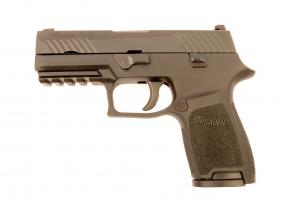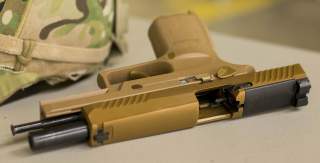Why the Army Is Destined to Love Sig Sauer's M17 and M18 Pistols
The new pistol is built with a more ergonomic configuration to better accommodate the widest possible range of hand grip techniques for soldiers and enable rapid hand switching as needed in combat. The M17 is said by developers to bring much tighter dispersion, improved versatility and next-generation accuracy.
The Army has been closely coordinating with the Special Operations community regarding training and development of the new handgun, given the consistency with which close-quarter combat is utilized by SOF.
Soldiers with the Army’s 101st Airborne Division have been the first to receive the services’ new high-tech 9mm pistol engineered to give dismounted infantry a vastly increased ability to fight and close with an enemy in caves, tunnels, crawl spaces, houses and other close quarter combat scenarios.
(This first appaered late last year.)
Service weapons developers and soldiers say the new M17 and M18 pistol, designed as a next-generation handgun to follow the Army’s current M9 Beretta, is expected to substantially change combat tactics, techniques and strategies for dismounted soldiers on-the-move.
“You can close with the enemy in close quarter combat and engage the enemy with one hand. It is tough to do this with the M9,” said Lt. Col. Martin O’Donnell, spokesman for the 101st Airborne.
Recommended: Why North Korea Is Destined to Test More ICBMs and Nuclear Weapons
Recommended: 5 Most Powerful Aircraft Carriers, Subs, Bombers and Fighter Aircraft Ever
Recommended: North Korea Has 200,000 Soldiers in Its Special Forces
The new pistol is built with a more ergonomic configuration to better accommodate the widest possible range of hand grip techniques for soldiers and enable rapid hand switching as needed in combat. The M17 is said by developers to bring much tighter dispersion, improved versatility and next-generation accuracy.
“With this weapon, you can change quickly from right hand to left hand. If you are shooting something that is not comfortable on your hand and can't get a comfortable grip, it is not as accurate,” said Sgt. 1st Class Andrew Flynn, 101st Division Master Gunner.
The new handguns are built with an external safety, self-illuminating sights for low-light conditions, an integrated rail for attaching enablers and an Army standard suppressor conversion kit to attach an acoustic/flash suppressor, service developers said.
“It increases target recognition and increases capability with night sights,” said Lt. Col. Steven Power, Individual Weapons Product Manager, Soldier Weapons.
The Army is now acquiring thousands of full-size XM17 and compact XM18 versions of the new 9mm pistol. The XM17 fires 147 grain jacketed hollow point ammunition.
When it comes to fast-evolving tactics now used in close-quarter combat, something with which Army soldiers fighting in Iraq and Afghanistan now have more than a decade of experience, an ability to maneuver with increased lethality in caves, tunnels, crawl spaces, attics or buildings allows soldiers to access life-impacting firepower more effectively - especially in “tight quarters” situations where a longer, larger rifle may not be available for use.
Fast emerging targets and quick-changing circumstances, fundamental to close-quarter combat, naturally require rapid decision making and on-the spot flexibility amid military confrontation. Requirements and technical improvements with the M17 were specifically designed with this in mind, Army developers emphasized.
“This ads a whole new dynamic to close-quarter combat. A standard pistol cannot change grips or allow a soldier to switch from a right-handed shooter to a left-handed shooter. This is a great capability for us to put in play,” Flynn said.
Close quarter combat, while considered indispensable to successful counterinsurgency warfare, is also something of significant relevance to large-scale force-on-force, mechanized combat against a potential near-peer adversary. Urban warfare - from urban combat in WWII to house-to-house fighting in Hue City in Vietnam - is naturally a long-standing component of major war as well.
Power explained that the Army’s M17 acquisition effort unfolded on a massively accelerated timeframe, moving to contract within 10 months.
“We are dual arming the infantry at the position of team leader and above,” Power said.
The fast-tracked acquisition effort, which merged work from the Army Research Lab and the Army’s Armament Research, Development and Engineering Center, drew heavily from modeling and simulation to expedite development of the new weapon.
The Army has been closely coordinating with the Special Operations community regarding training and development of the new handgun, given the consistency with which close-quarter combat is utilized by SOF.
The M17 and M18 pistols are manufactured by Sig Sauer, who earned the $580 million contract to produce the weapons in January of this year.
Other competitors included Glock, FN America and Beretta USA.
This first appeared in Warrior Maven here.


